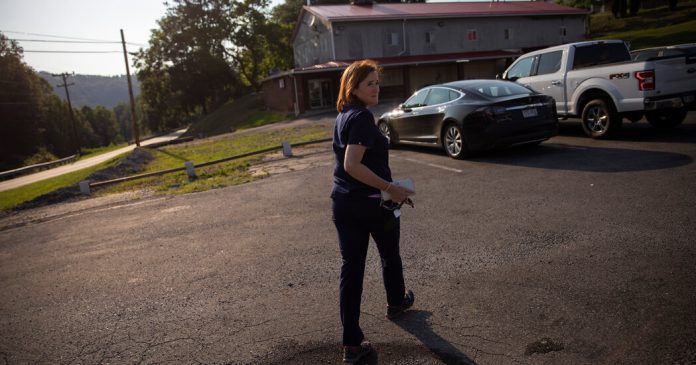However because the political local weather round Covid-19 grew heated, and as a few of Dr. Becher’s sufferers and neighbors started to dismiss the science, she grew to become annoyed, then indignant. She started to run extra, typically twice a day, for hours at a time, “raging down the street.” She was mad concerning the widespread mistrust of vaccines; mad about academics who went to highschool even after testing optimistic for the virus; mad concerning the endemic meals insecurity, the county’s lack of reasonably priced transportation, the excessive price of fatty liver illness.
The indignities layered one atop the subsequent, forming a suffocating stack. Greater than something, Dr. Becher was mad at how she couldn’t appear to do something about any of it. Some days she went house from work, chugged a beer and ran for miles. Then, on April 17, 2021, her coronary heart broke.
Anger, Exhaustion, Despair
In 1981, two psychologists on the College of California, Berkeley, revealed a paper within the Journal of Occupational Conduct on “the burnout syndrome.” The authors, Christina Maslach and Susan E. Jackson, got down to measure the diploma of stress and emotional exhaustion skilled by professionals like medical doctors, social staff, therapists and academics who, they famous, should consistently navigate difficult interactions “charged with emotions of anger, embarrassment, concern or despair.”
Their questionnaire — the Maslach Burnout Stock, or M.B.I. — is now a scientific commonplace. Amongst physicians, a excessive rating on the M.B.I. has been linked to elevated errors, decreased affected person satisfaction and fast turnover. Burned-out medical doctors present greater charges of heart problems, substance abuse and divorce. A 2017 examine of about 5,000 physicians revealed in Mayo Clinic Proceedings discovered that some 44 % exhibited not less than one signal of burnout. A 2019 report by the Nationwide Academy of Drugs pointed to research exhibiting that 54 % of physicians and nurses had been burned out.
“Your sufferers form of embrace you as part of their neighborhood; they nearly change into part of your loved ones,” stated Dr. Tate Hinkle, a household physician in Lanett, Ala. Many physicians cite these interpersonal connections as the first cause they go into household medication. However the sense of dependency can place a big emotional burden on medical doctors, Dr. Hinkle stated, particularly in remoted rural areas, the place continual diseases and social disadvantages superimpose: “It simply provides that sense of stress on your self to be sure you handle folks.”


